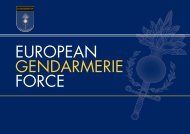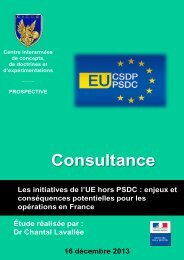Conference
science-research-bulletin-2013-conference
science-research-bulletin-2013-conference
Create successful ePaper yourself
Turn your PDF publications into a flip-book with our unique Google optimized e-Paper software.
EUROPEAN POLICE SCIENCE AND RESEARCH BULLETIN<br />
SPECIAL CONFERENCE EDITION<br />
ENHANCING COORDINATION IN THE AREA<br />
OF SECURITY AT MAJOR EVENTS<br />
Barbara Maria Rohmann<br />
Italy<br />
Keywords: Major Events Security, international coordination, international standards, best standards,<br />
lessons learnt<br />
Abstract: The UNICRI programme on security at major events is aimed at supporting policy-makers and<br />
practitioners in planning security during major events. On account of their scale and/or high visibility,<br />
major events (defined as any event requiring international cooperation with respect to security planning,<br />
such as large sporting events, including the Olympic Games, high-level summits and other mass events,<br />
such as national and religious festivals) are vulnerable target for unlawful activities, including terrorism,<br />
and can be exploited by organized criminal groups to further their illegal activities.<br />
UNICRI has developed and implemented<br />
regional initiatives in this area. The initiatives<br />
provide training and advisory services to security<br />
planners in preparation for major events.<br />
The European regional initiative is entitled<br />
“Enhancing European Coordination for National<br />
Research Programmes in the Area of Security<br />
at Major Events – THE HOUSE” and is being<br />
implemented from 2012 to 2014. It involves<br />
24 European Union Member States with the<br />
coordination and implementation responsibility<br />
vested in UNICRI, drawing on the achievements<br />
of seven years of activities and previous UNICRI<br />
projects.<br />
UNICRI assists several Member States, within<br />
the framework of these regional initiatives, in<br />
organizing major events. These include in the<br />
past e.g. Trinidad & Tobago for the carnival,<br />
Mexico for the Pan-American Games and the<br />
G20 Summit in 2012; Costa Rica for the Central<br />
American Games; Cyprus and Ireland for the<br />
EU Presidency, Poland for the Euro Soccer Cup,<br />
Bulgaria for the World Cup qualification and<br />
Finland for the Euro Athletics.<br />
INTRODUCTION<br />
The United Nations Interregional Crime<br />
and Justice Research Institute (UNICRI) was<br />
established in 1967 to support Member States<br />
in the areas of crime prevention and criminal<br />
justice. In furtherance of its mandate, UNICRI<br />
uses action-oriented research to assist in the<br />
formulation of improved policies and concrete<br />
intervention programmes. Against this backdrop,<br />
UNICRI identifies areas of common concern to<br />
Member States which are of critical importance<br />
to the international community in general, upon<br />
which to concentrate. Security planning for<br />
major events is one such area.<br />
For the purposes of its work, UNICRI defines<br />
Major Events as events requiring international<br />
cooperation in respect of their security planning.<br />
Broadly speaking, these can be separated into<br />
four categories: sporting events (Olympics, World<br />
Championships, etc.); political events (summits,<br />
State visits, etc.); cultural events (carnivals,<br />
festivals, etc.); and, other mass gatherings<br />
(scientific conferences, International expositions<br />
etc.). Major events are windows of opportunity<br />
due to the fact that they are often accompanied<br />
by substantial increases in the financial, human,<br />
technological, and other resources which are<br />
available to national security planners. As a<br />
result, major events offer the finance and the<br />
134





